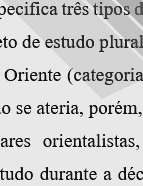

In 1919, Sebastião Dalgado would follow the lead of his predecessors and define orientalism as a field of knowledge bringing together various subfields and geographies, but refrained from restricting it to specific temporal criteria or linguistic concerns. He described the field as the “[r]ange of studies concerning the East and the Far East. Such studies encompass Sanskritology, Sinology, Iranology and those studies with respect to Malaysia, Indochina, Japan and Arabia. Orientalism is also understood to mean ‘a hyperbolic or symbolic locution in the style of the orientals’” (Glossário Luso-Asiático, 1919, p. 124). The remark made by the ‘oriental’ orientalist about the hyperbolic and symbolic, almost carnivalesque, use of the term by Europeans to refer to “the style of the orientals” is significant. If, on the one hand, it signals a tacitly assimilated notion of difference between the ‘oriental’ and the non-‘oriental’, on the other it distinguishes between two different levels of understanding of orientalism. The first is that of an academic, disciplinary field, the second functions on a discursive level, which is to say, as a way of thinking about, describing and representing people from the Orient. Such “a style of thought” would serve decades later to support Edward Said’s argument that orientalism is “based upon an ontological and epistemological distinction made between ‘the Orient’ and (most of the time) ‘the Occident’” (Orientalism, 2003, p. 2). In nineteenth-century Portuguese criticism, this difference also works on the level of identity, in so much as the Orient often serves as an expedient of self-knowledge, or as an instrument of self-criticism. Wenceslau de Moraes offers a clear literary example of this. In works such as Relance da Alma Japonesa [Glimpse of the Japanese Soul] (1926) and Cartas do Japão [Letters from Japan] (1902-1913), the Portuguese exile presents a feminine configuration of Japan as a kind of celebration of this Orient, in which he recognizes a civilizational model offering the possibility of rehabilitation and regeneration, not only for Portugal but for the entire white race. Although he criticizes the inertia of Portugal’s colonial policies, particularly with respect to Macau, the author repeatedly denounces the whole colonial enterprise and even argues in favour of its abolition. The writer is particularly worried about its potentially harmful effect on human morality and positions himself against violence – military, administrative, or otherwise – in colonial spaces. Instead he proposes a kind of intervention directed towards commerce and the exploitation of colonial products through the centralizing actions of the metropole.
